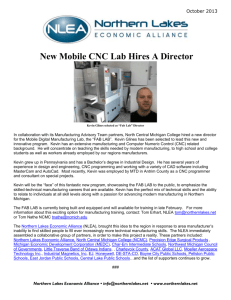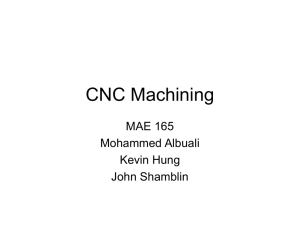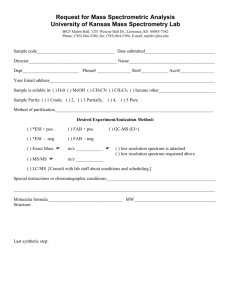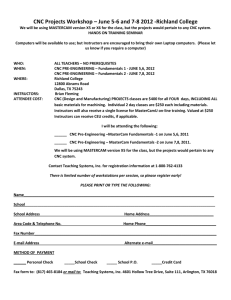Increasing Rigor Through STEM
advertisement
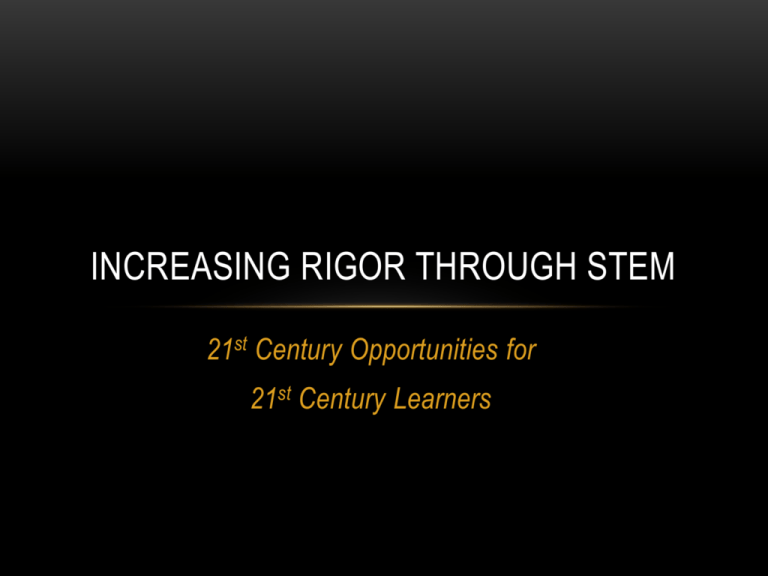
INCREASING RIGOR THROUGH STEM 21st Century Opportunities for 21st Century Learners COLLABORATING WITH COLLEAGUES • Collaborated with FACS classes • Collaborated with Athletic Director • Collaborated with US History teachers • Collaborated with Math Department • Collaborated with PE Department • Collaborated with AG Department • Collaborated with Science Department • Collaborated with Theater Department TIMELINE • November 2012: Intro to Engineering new course proposal submitted to high school faculty for approval. • December 2012: Approved proposal submitted to FPS Board of Education for approval by Dr. Hull. • April 2013: MOREnet announces a $400,000 grant opportunity for public and private school MOREnet member districts. DESIGNING THE COURSE Course Description: • Introduction to Engineering Design focuses on how ideas for solution to problems become implemented, manufactured or produced in the real world. Students will learn about different aspects of engineering and engineering design. Students will learn how engineers communicate through drawing with blueprints, work in teams to solve problems and design new products. Students will begin with basic background work to build their skill-set and will eventually work in design teams on semester projects. The first semester will focus on civil engineering themes. The second semester will focus on mechanical engineering themes. 1ST SEMESTER The course covers the following: • Scientific concepts of Mechanical, Fluid and Electrical Engineering • Engineering Design Process • Background on Safety and Basic tool use for projects in course. • Project Management • Describe field of study within civil engineering. • Research projects and work of civil engineers. • Study of technical drawings ( Blueprints) Following simple blueprints. • Work cooperatively in teams to design, test, and report solutions to engineering problems. • Introductory work using CAD Software and 3-D Printing • Projects: BLUEPRINTS, SURVEYING, INSULATION PROJECT, MANUFACTURED I BEAM, BRIDGE, TREBUCHET, SMALL BUILDING FRAMING 2ND SEMESTER • Describe field of study within Mechanical Engineering. • Electrical Engineering • Study and Construct simple electrical circuits • Study and Construct devices capable of generating electricity • Thermal Engineering • Study and Construct heat flow and transfer within closed and open sytems. • Study and Construct experiment on the utilization of heat energy. • Fluid Engineering • Study the basic principles of fluid mechanics. Design a pneumatic device to address a specific problem. • Work cooperatively in teams to design, test, and report solutions to engineering problems. YEAR 2: ENGINEERING RESEARCH & DESIGN • Advanced CAD software use • Advanced Modeling using Subtractive-Rapid Prototyping (SRP) (new in 14-15) • Introduction to CNC Plasma Software and Hardware (CNC Plasma Cutter new in 14-15) • Advanced Robotics and Programming Project REPURPOSING CLASSROOM SPACE • An existing Industrial Arts classroom attached to a shop area had become a surplus storage area. VALUABLE REAL ESTATE INITIAL STUDENT ENROLLMENT GOAL 15 So, we planned for one Intro to Engineering HOWEVER… 67students immediately registered for the class. MORENET GRANT OPPORTUNITY NO Restrictions = Thinking Outside the BOX HOW DO WE TAKE THE NEW ENGINEERING COURSE TO THE NEXT LEVEL? • Discussed importance of STEM • Discussed importance of equipment • Discussed importance of student-led learning • Discussed the importance of technical reading and writing • These discussions led to the focus of the grant, which resulted in the first true FAB LAB in a K-12 public school district in the state. WHAT IS A FAB LAB? • Fab Labs are commonly associated with engineering, computer programming, design thinking, and mathematics courses, but in truth support all subject areas and are frequently a catalyst for interdisciplinary instruction, enabling teachers and students to create connections between subjects that would traditionally remain in isolated curriculum areas. FAB LAB PROJECT GOALS 1. Develop a model for an affordable, replicable, hands–on, and technology–rich 21st century learning space for high school students that supports STEMx learning and teaching in ways a traditional classroom cannot; a space that serves not just as a school resource but a resource for the larger local community. GOALS CONTINUED 2. Develop a sustainable professional development plan and materials for teachers and technology coaches to support such learning spaces. 3. Develop best practices for Fab Labs in high school education and serve as a regional and national demonstration center. 4. Prepare the groundwork for this project to inform professional practice and curriculum to enable the school to extend the Fab Labs into the middle and elementary grade levels. IMPACTING LEARNING “Learning is often confused with education…. The best way to understand circles is to reinvent the wheel.” —Nicholas Negroponte Through the use of Fab Lab, Fulton students will be “reinventing the wheel.” Using a constructivist approach, the Fab Lab is not designed to deliver knowledge but to create conditions where students build their own knowledge through exploration and the reconciling of new information with what the student already knows. PROFESSIONAL DEVELOPMENT In the case of the Fab Lab, our initial professional development activities will focus on a cohort of “early adopters,” teachers who have self–identified or been nominated by their school principal for participation in the project. This approach will allow the project to experience creative successes and failures, to develop a distributed base of expertise that can evangelize on behalf of the lab by sharing experiences with the larger faculty, and recruiting teachers who are intrigued for years two and three of the project. DISTRICT SUMMER PD OPPORTUNITIES FOR TEACHERS • 3-D Printing Workshop • Vinyl Cutting Workshop • CNC Basics SUPPORTING THE SHIFTS IN ELA • Developing Student Literacy is a Shared Responsibility • Meet the need for CCR students to be proficient in reading complex informational texts, independently, and in a variety of content areas. • Most of the required reading in college and workforce training programs is informational in structure and challenging in content. READING: TEXT COMPLEXITY RATIONALE • Elementary and secondary students are not required to read enough informational text independently even though expository text makes up the vast majority of the required reading in college and the workplace. (CCSS Appendix A, p.2) SUPPORTING THE SHIFTS IN MATH • Focus • Coherence • Rigor CLEANING OUT CLEANING CONTINUED… PUTTING THE GRANT $$ TO WORK • 4 Makerbot 3-D Printers • Roland GX-24 Vinyl Cutter • Heat Press • Epilogue Laser Engraver Cutter • Shopbot PRS Alpha 4896 CNC Machine • 12 Desktop and 24 Chromebook Computers • Traditional “Analog” Equipment PUTTING THE $$ TO WORK IN 2014-15 • PlasmaCam 4x4 CNC Cutter • Shopbot Desktop 1824 CNC Machine with Lathe • Roland MDX-40A SRP with Rotary Axis • Classroom Set of Boe-bots (24) CNC MACHINE ARRIVES CNC MACHINE AT WORK VINYL CUTTER LASER CUTTER STUDENT ENGAGEMENT IN THE DESIGN PROCESS DAILY PROBLEM SOLVING CNC PLASMA CUTTER ROLAND SRP MACHINE LAB IN ACTION • http://watch.more.net/media/fab-lab-fulton-mo RIBBON CUTTING ADDITIONAL OPPORTUNITIES Field Trips STEM Day at the Capitol Competitions Problem Solving Learning new technology Students taking PRIDE and OWNERSHIP in their work STEM DAY AT THE CAPITOL HELPING OUR COMMUNITY • SERVE, Inc. • Year 3: Open the lab once a week to the community • Offer training to community members for specific equipment STUDENTS • Engagement at different levels • Technical Reading • Technical Writing (includes software design and plans) • Infusion of higher level mathematics • Communication and Negotiation IT IS ALL ABOUT ENGAGEMENT CREATING ITEMS FOR PROM DECORATIONS CORPORATE MENTORS • Ameren UE • Professional Contractors and Engineers • MU School of Engineering • Linn State Technical College • Danuser • Missouri Society for Professional Engineers FHS FIRST ROBOTICS TEAM FULTON’S FIRST ROBOT CONTACT INFORMATION • Mr. Jim Hall jhall@fulton58.org • Dr. Suzanne Hull shull@fulton58.org
